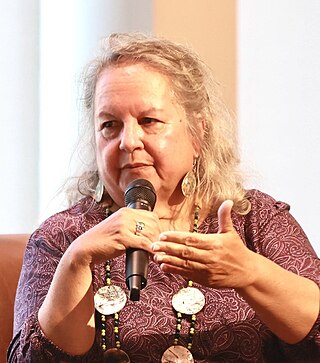
Aldo Leopold was an American writer, philosopher, naturalist, scientist, ecologist, forester, conservationist, and environmentalist. He was a professor at the University of Wisconsin and is best known for his book A Sand County Almanac (1949), which has been translated into fourteen languages and has sold more than two million copies.
Environmental studies is a multidisciplinary academic field which systematically studies human interaction with the environment. Environmental studies connects principles from the physical sciences, commerce/economics, the humanities, and social sciences to address complex contemporary environmental issues. It is a broad field of study that includes the natural environment, the built environment, and the relationship between them. The field encompasses study in basic principles of ecology and environmental science, as well as associated subjects such as ethics, geography, anthropology, public policy, education, political science, urban planning, law, economics, philosophy, sociology and social justice, planning, pollution control, and natural resource management. There are many Environmental Studies degree programs, including a Master's degree and a Bachelor's degree. Environmental Studies degree programs provide a wide range of skills and analytical tools needed to face the environmental issues of our world head on. Students in Environmental Studies gain the intellectual and methodological tools to understand and address the crucial environmental issues of our time and the impact of individuals, society, and the planet. Environmental education's main goal is to instill in all members of society a pro-environmental thinking and attitude. This will help to create environmental ethics and raise people's awareness of the importance of environmental protection and biodiversity.
Ecocentrism is a term used by environmental philosophers and ecologists to denote a nature-centered, as opposed to human-centered, system of values. The justification for ecocentrism usually consists in an ontological belief and subsequent ethical claim. The ontological belief denies that there are any existential divisions between human and non-human nature sufficient to claim that humans are either (a) the sole bearers of intrinsic value or (b) possess greater intrinsic value than non-human nature. Thus the subsequent ethical claim is for an equality of intrinsic value across human and non-human nature, or biospherical egalitarianism.
The following outline is provided as an overview of and topical guide to environmental studies:

Yale School of the Environment (YSE) is a professional school of Yale University. It was founded to train foresters, and now trains environmental students through four 2-year degree programs, two accelerated degree programs for graduates of Yale College, and a 5-year PhD program. Still offering forestry instruction, the school has the oldest graduate forestry program in the United States.

Aldo Starker Leopold was an American author, forester, zoologist and conservationist. Leopold served as a professor at the University of California, Berkeley, for thirty years within the Zoology, Conservation, and Forestry departments. Throughout his life, Leopold was a public face for science. He was active in numerous wildlife and conservation groups and made significant research contributions in ornithology, mammalogy, and wildlife ecology. Leopold is notable for his ecosystem management paper, the Leopold Report, and his considerable presence in some of the most controversial wildlife issues, including national park wildlife policy, predator control, wildlife refuge, and fire policy.

Robin Wall Kimmerer is a Potawatomi botanist, author, and the director of the Center for Native Peoples and the Environment at the State University of New York College of Environmental Science and Forestry (SUNY-ESF).

The School for Environment and Sustainability is the school of environmental science and sustainability studies at the University of Michigan, a public research university in Ann Arbor, Michigan.
The Yale Center for Environmental Law & Policy is a joint initiative between the Yale School of Forestry & Environmental Studies and the Yale Law School.

Northeast Forestry University is a public university in Harbin, Heilongjiang, China. It is affiliated with the Ministry of Education, and co-founded by the Minister of Education, the National Forestry and Grassland Administration, and the Heilongjiang Provincial People's Government. The university is part of Project 211 and the Double First-Class Construction.
The Master of Resource Management (MRM) degree is a graduate degree program in the School of Resource and Environmental Management at Simon Fraser University in Burnaby, British Columbia, Canada. and the university centre of the Westfjords, Iceland. This program is designed for both recent graduates and individuals with experience in the private or public sector in dealing with natural resources and the environment. The program seeks students from a range of disciplines including biology, engineering, chemistry, forestry, geology, business, economics, geography, planning and social sciences. The program is recognized as an accredited sustainable planning program by the Canadian Institute of Planners and the Association for the Advancement of Sustainability in Higher Education.
The University of Maryland College of Agriculture and Natural Resources is the agricultural and environmental sciences college of the University of Maryland and operates the Maryland Sea Grant College in cooperation with the University of Maryland Center for Environmental Science and the National Oceanic and Atmospheric Administration.
The College of Natural Resources and Environment at Virginia Tech contains academic programs in forestry, fisheries, wildlife sciences, geography, and wood science. The college contains four departments as well as a graduate program in the National Capital Region and a leadership institute for undergraduates.

Vietnam National University of Agriculture, until 2014 Hanoi University of Agriculture (HUA), is an education and research university specializing in the agricultural sector. The university is located in Trau Quy town, Gia Lam district, a Hanoi suburban area, about 12 km far from Hanoi city centre.
Social ecology studies relationships between people and their environment, often the interdependence of people, collectives and institutions. Evolving out of biological ecology, human ecology, systems theory and ecological psychology, social ecology takes a “broad, interdisciplinary perspective that gives greater attention to the social, psychological, institutional, and cultural contexts of people-environment relations than did earlier versions of human ecology.” The concept has been employed to study a diverse array of social problems and policies within the behavioural and social sciences.

The Lilongwe University of Agriculture and Natural Resources (LUANAR) is a university outside Lilongwe, Malawi. It was formed in 2011 by a merger between Bunda College of Agriculture of the University of Malawi and Natural Resources College (NRC).
Paige Fischer is an environmental scientist from the Pacific Northwest whose research focuses mainly on the human dimensions of environmental changes. She is especially interested in forest ecology and conservation. She is currently an assistant professor at the University of Michigan's School for Environment and Sustainability, teaching upper level classes about analysis methods and social vulnerability to climate change.

NDHU College of Environmental Studies and Oceanography is an interdisciplinary school of Environmental Studies and Oceanography of National Dong Hwa University (NDHU). Founded in 2009, NDHU CESO is formed as Taiwan's first school for Environmental Studies through merger of Graduate Institute of Natural Resources Management, Graduate Institute of Environmental Policy, Graduate Institute of Ecological and Environmental Education, Graduate Institute of Earth Sciences, Graduate Institute of Marine Biology, and Graduate Institute of Biological Resources and Technology from National Dong Hwa University and National Hualien University of Education.







